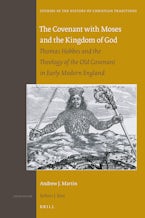- Home
- Oxford Theology and Religion Monographs
- religion
- history
- Theology and the University in Nineteenth-Century Germany

Theology and the University in Nineteenth-Century Germany
By: Zachary Purvis
Series: Oxford Theology and Religion Monographs
336 Pages
- Hardcover
- ISBN: 9780198783381
- Published By: Oxford University Press
- Published: September 2016
$100.00
Historical research on Christian theological modernism—and in particular the modernism of post-Enlightenment German Protestant thought—has made great strides over the past two decades and begun to fill in significant gaps in scholarly discussion of “minor” thinkers (often actually major players in their own time who have unfortunately been forgotten by later generations). An accompanying effect of this renewed historical engagement has been that “major” figures such as Friedrich Schleiermacher and G. W. F. Hegel are read in more plausible and less heroic terms, and better contextualized with regard to their contribution to theological inquiry and the human sciences.
Zachary Purvis offers a really splendid contribution to this literature, and excels beyond many comparable efforts because of the focus he marshals in establishing his claims. The title of the study is Theology and the University in Nineteenth Century Germany, but its thesis is more specific. Purvis is interested in theology as science (Wissenschaft), a topic that has been tackled by others, but Purvis helpfully uncovers this development of theological self-understanding through the scholarly genre of encyclopedia in its development during an era of idealist system-building as a normative pedagogical approach to theological study. The encyclopedia tradition rose to prominence out of the continental Enlightenment and was established in the modern research university through the influence of both Schleiermacher and Hegel during their careers at the newly founded University of Berlin. Through mid-century, the encyclopedia tradition developed in both speculative and mediating traditions of theology before gradually being superseded, not so much by a coherent counter-program as by a collective diverted attention to new and increasingly diverse methodological programs.
The first significant set of “minor” voices discussed by Purvis set the stage for Schleiermacher’s coming of age as a theologian. The encyclopedias of Johann August Nӧsselt of Halle and Gottlieb Jakob Planck of Gӧttingen assimilated the new perspectives of science emerging from the neo-humanism of the Enlightenment and applied them to theological textbooks, an approach Schleiermacher would employ in his own early career as a professor. But these texts would prove to be merely transitional. Schleiermacher was decidedly in favor of reforming theological instruction according to a more encompassing idealistic system. He was sympathetic, then, to a critical review of his own Halle theology faculty, published in the Jenaische Allgemeine Literatur-Zeitung in 1805 by Johann Stephen Schültze. Although Schleiermacher’s name was appended to a defensive response written by the faculty, he actually affirmed elsewhere that he was “in complete agreement” with the review and only objected to the impropriety of its approach (119).
These background analyses contextualize Schleiermacher’s own contribution to this developing tradition, which came not in the Glaubenslehre, but rather in the more modest Kurze Darstellung des Theologische Studiums (published in 1811). In this text, the whole of theological study was divided (in contrast to the traditional fourfold structure of exegetical, historical, dogmatic, and practical) into philosophical, historical, and practical theology. Purvis describes Schleiermacher’s encyclopedia and its influence on later theologians like August Twesten, the Catholic Tübingen theologians, and surprisingly, even Edward Pusey (161).
As with other histories of nineteenth century theology, Purvis identifies the speculative idealism of Hegel as the main institutionalized alternative to Schleiermacher, and this opposition narrative holds up well even when considering the very particular history of the theological encyclopedia. Hegel’s encyclopedia project was followed by those of Carl Daub, Philipp Marheineke, and Karl Rosenkranz, all of whom are known well enough as primary exponents of Hegelianism in the first generation after his death, but are less discussed as a part of the encyclopedia tradition. As the legacy of Hegelianism became increasingly materialist in orientation, its influence on systematic theological study waned and gave place to the “Mediating Theology,” a sort of middle way that had existed since the time of Schleiermacher’s immediate disciples, but which Purvis highlights in the career of the Basel theologian Karl Rudolf Hagenbach.
In the conclusion, Purvis speaks briefly of the disfavor toward the encyclopedia tradition shown by Karl Barth and Weimar-era dialectical theology (225-27), but many of the characteristics that he highlights in this theological movement could just as well be traced back to Albrecht Ritschl and Wilhelm Herrmann (Purvis’s reference to Christoph Chalamet’s study is therefore apt). If more chapters are to be written on the dismantling of the theological encyclopedia in German-speaking scholarship during the twentieth century—and Purvis lays inspirational foundations for such a project—then such a history would do well to include the wider neo-Kantian and Ritschlian tributaries that fed into the primary European theological revolution of the tumultuous twentieth century.
More necessary, though, and I think much more interesting because it tends to be neglected by theologians, is the project of engaging with late nineteenth century critical theology in the work of Franz Overbeck, Carl Albrecht Bernoulli, and the History of Religions School (220-23). If there is an heir beyond the great nineteenth century encyclopedias to the idea of Theologie als Wissenschaft, it will be found in the ferment of conflicting attempts to determine the best methodological approach to Religionswissenschaft in accordance with the emerging social sciences. Purvis’s sharp attention to Hagenbach’s Basel would play well into such an inquiry. But the story should by all means culminate back in Berlin and with Ernst Troeltsch, who sought to accommodate the new social-scientific methodologies into a grand synthesis and thereby establish theology as scientific “in the German sense”—a process that Schleiermacher had begun a century earlier.
Evan Kuehn is Theological Librarian at Rolfing Library, Trinity International University.
Evan KuehnDate Of Review:December 14, 2016
Zachary Purvis is a Leverhulme Early Career Fellow in the School of Divinity at the University of Edinburgh.











